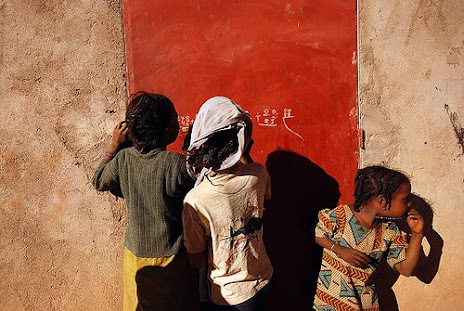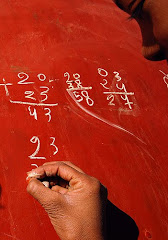What a difference 15 minutes can make to a persons views on learning. I watched Sir Ken Robinson make a case for creating and supporting the need for creativity in education. I couldn't help but see the correlation between what Sir Ken calls "educating people out of creativity",(2005) and the difficulty students have with making connections among and between math concepts and processes . I have watched students struggle to communicate their mathematical reasoning. I have seen that many are unable to apply learned concepts in new or different circumstances. I have long questioned if the difficulties students were demonstrating were due to the fact that children may not have the cognitive maturity to isolate their thought processes as is needed in the latest approach to mathematics . Otherwise, as my thinking went, wouldn't the reform in the approach to instruction of mathematics that has been in practice for more than 10 years, have mediated this weakness and produced children who could explain their thinking?
Now it occurs to me that the root of the problems we are seeing in the learning of mathematics may be due to the fact that we have an educational system that has, as Sir Ken says, " educated people out of creativity" (2005). Sir Ken makes the argument that creativity is as important as literacy and that our education system is failing to cultivate this, (In a later speech at the Apple Educational Leadership Summit (2008) he added that creativity is as important as literacy and numeracy.) If creativity is not valued, if students learn early that mistakes are the worse things you can make how can we expect them to truly understand the underlying concepts in mathematics. Without creativity, without being willing to try new ideas and be wrong, students quickly turn to the teacher to show them the 'right' way to do math. In other words, if creativity was valued as much as literacy and numeracy then perhaps students ability to create understanding and learning in any area through investigation would be a natural process and as such more successful.
In our school district we have the following 'specialist' positions, Instruction and School Leadership , Student Support Services, Math/ Technology, Science/Technology,Primary/Elementary Math, Primary/Elementary literacy but no where is there mention of creativity. It is mind boggling to realize that the system we have invested so much in was founded on a model designed, according to Sir Ken, to meet the needs of the industrial revolution! It is ironic that the shift in thinking and instruction of math that teachers have been asked to make is based on teaching children to see 'the big ideas' in math. Seeing the big ideas means being able to think outside the box,make the connections, understand the underlying processes are all necessary in mathematics. However, the fact that even futurists are unable to predict what the world will look like in 5 years begs the question just who needs to look at the bigger picture? Sir Ken makes a very good case for changing our education system to one that nurtures creativity, not just for mathematics, but to better prepare students to have 'live lives of purpose and meaning"(Robinson, 2008). Isn't this the point of what we do after all?
Video Links Have Been Moved!
Sunday, September 27, 2009
Subscribe to:
Comments (Atom)

